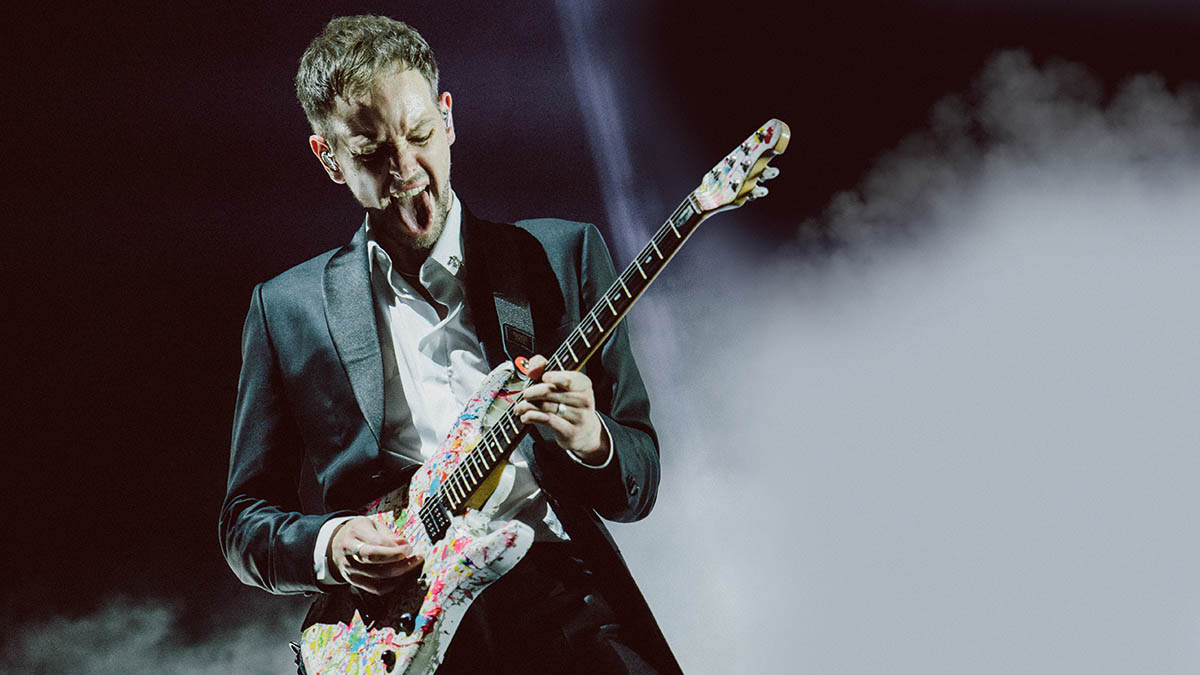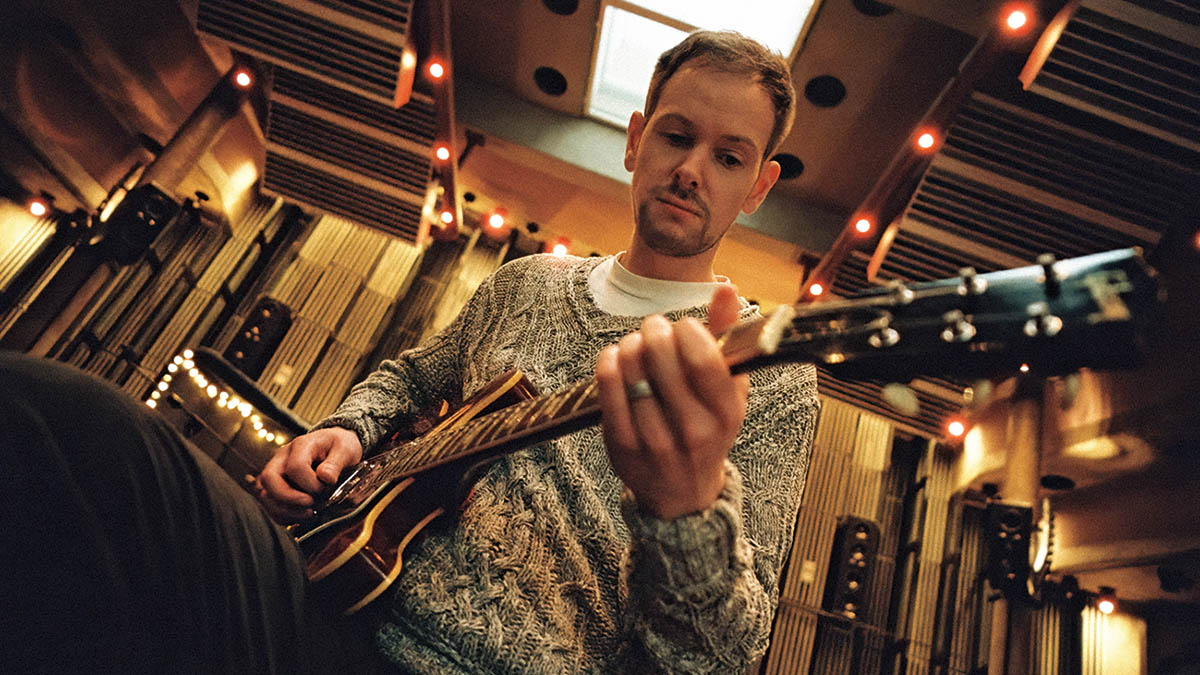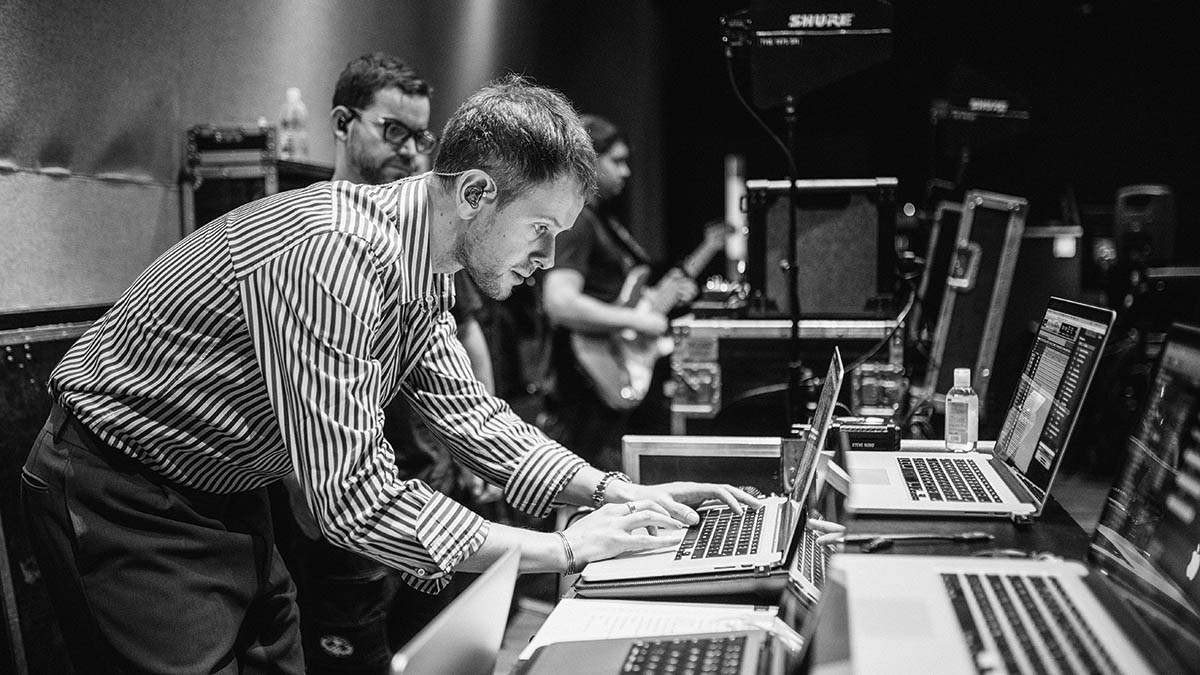The 1975’s Adam Hann on his love of John Petrucci’s signature model, divvying up parts with Matty Healy and snapping up Klon Centaurs
The secret metalhead, maximalist, and one half of The 1975's guitar duo takes us inside the English pop-rockers' intimate new album, Being Funny In A Foreign Language

It’s a grey Monday morning, and Adam Hann, lead guitarist of indie-pop behemoths The 1975, is reflecting on the burnout caused from recording the band’s fourth album, 2020’s Notes On A Conditional Form.
“We decided to do our third and fourth albums back to back,” he says. “When you’re on tour, you’re finishing at 1.00am or whatever, and then it was like, ‘Time to get working on this album!’ It just proved very challenging,” he sighs. “There’s a reason people make albums in the traditional way, and that’s because it works...”
The Covid-19 pandemic forced the group to release Notes On A Conditional Form to a locked-down audience worldwide, though it nevertheless went straight to number 1 in the UK. An 80-minute, 22-song epic, Notes... saw the group experimenting with everything from stoner rock and Americana to UK garage and IDM.
After taking some time off, the four members of The 1975 – Hann, vocalist/guitarist Matty Healy, bassist Ross MacDonald and drummer George Daniel – regrouped to record a shorter, more intimate sounding album, Being Funny In A Foreign Language, which was released earlier this month.
Trying to get the very best out of themselves as both writers and players, the group teamed up with superstar producer Jack Antonoff, acclaimed for his work with big-name artists such as Taylor Swift, St. Vincent and Haim.
“I think we’d had this really difficult experience with the fourth album,” Adam says, “and I think we just wanted someone who’s made a lot of albums and knew what they were doing. Someone who had a different process in the studio...”
Dressed in a crisp white shirt and red polka dot tie while speaking to TG from his London home via Zoom, Adam looks confident and rejuvenated following his return to the public eye. Some three weeks earlier, the band headlined the prestigious Reading and Leeds Festival for the second time in their career; two sets which doubled as their first UK shows since March 1, 2020.
Get The Pick Newsletter
All the latest guitar news, interviews, lessons, reviews, deals and more, direct to your inbox!
Over a lengthy conversation, Adam talks about his teenage love of metal, how he and Healy play each other’s parts live, and the change of direction the band took for their new material: “This time around,” he says, “it’s all about capturing the moment...”
We’d been in this digital world where we’d record everything in the box. We just wanted to try and step away from that and give it some humanity
For your new album, you brought in Jack Antonoff – one of the most in-demand producers in the world. What inspired this decision?
“Jack actually works in quite an analogue world. On our third and fourth albums, aside from recording stuff, we’d been in this digital world where we’d record everything in the box. We just wanted to try and step away from that and give it some humanity. That was one of the main reasons for getting Jack, alongside just needing a safe pair of hands, really. Someone to help carry the load.
“Our first and second albums [2013’s The 1975 and 2016’s I Like It When You Sleep, For You Are So Beautiful Yet So Unaware Of It] were a co-production with George [Daniel], Matthew [Healy] and [producer] Mike Crossey, but the third [2018’s A Brief Inquiry Into Online Relationships] and fourth [Notes...] we did all on our own.
“It was a great experience, but I think when it came to this album we just wanted to be more like the artists, even though it’s still a co-production. We just needed a new energy brought to the session, which was definitely the case.”
Matty has spoken about this album really highlighting your ability as musicians, not just songwriters and producers.
“It’s one of those funny things. We’ve always made a demo in the box or recorded parts for a demo and then gone to a studio and re-recorded stuff, and then you get to playing it live and then all of a sudden, because you’ve never really played it together as a band before, you think about it in a different way, and there’s ideas that you didn’t think of at the time when you were in the studio focusing on recording that one guitar part.
“There are a few tracks on this record where we just played live in the studio, and at Real World [Peter Gabriel’s studio in Box, Wiltshire], where we recorded most of the album, there’s an amazing control room that’s big enough to have everything set up all at once.

“In an average studio session you’d record the drums, then take everything down and record guitars, but we wanted to leave everything up. We wanted to just play together and record it and have that be the genesis of the track instead of, like, tracking drums then bass, that kind of thing.
“It brought a real humanity to the record. As a musician, it was a much different experience this time. Previously I’d just focus on a part and do, like, a gazillion takes. This time, you’d come to it and make the part and play the part at the same time, and it was more about capturing the moment. Jack would be like, ‘grab a guitar, play something over this’. You’d do it once or twice and he’d be like, ‘Cool, done.’ We were like, ‘Okay... are you sure?’ [Laughs].”
Did Jack have any ideas about your approach to playing or tracking at all?
“Jack was all about ‘the moment’ – that your first instinct is your best instinct. So whatever we do naturally, that was what we used. It also kept the energy up, so it wasn’t like we were sat around for two hours doing guitar takes on the fucking verse guitar, you know? You’d do a couple takes and then you’d move on, you’d move to keys or whatever. It kept this energy going that we’d never experienced before. You also felt a bit of pressure that you’d never felt before in this studio, which was interesting!”
In a band as tight and considered as The 1975, do you get the chance to improvise much?
“Yeah, for sure. Obviously there are parts put in demos that are going to be the parts, but there was a lot of improvising done to create the parts in those moments. It felt uncomfortable at first, because like you said, everything previously had been very considered.
“You’d play a part and go in and sit with it or tweak it a bit and it was all very methodical and processed. Whereas this time it was just capturing the moment instead of constructing a part. That’s where you convey the humanity in the recording. We stayed away from heavily editing and heavily comping to give it a more human feel.”
The lead break in Happiness is a particular album highlight. It was great to see you get the chance to rip it up live in your Reading set.
“That solo is funny because it originally started on an electric guitar, and it was this kind of fuzz, bitcrushed thing like you’d hear on a Daft Punk record. When it came to recording it, it just felt too obvious, so we thought, ‘What have we never done before?’ We’d never done anything like that on an acoustic guitar, so we just decided to do that.
“When it came to playing it live, we thought, ‘Do we change and pick up an acoustic guitar for this bit?’ We did that in rehearsal and it was a bit awkward, and, for Reading at least, we decided we weren’t quite happy with the way it was sounding and so we used an electric guitar with an acoustic simulator. It doesn’t sound like an acoustic, but it definitely has a vibe.”
You’ve been playing your Music Man John Petrucci JP6 signature model on stage recently.
“Yeah. I bought it with money I inherited from my grandmother when I was a teenager. I was going through this phase of being a big metalhead, and then we started doing The 1975, and it kind of got put away and never used. Then, on our second album, our manager was like, ‘Bring that guitar, maybe you’ll use it for something’ and it turned out to be the backbone for a lot of the guitar [tracks].
“In the middle [pickup] position it sounds like this insane Strat-elite because it has this very clear, very clean active sound, but it’s not an active guitar. It has this little rubber washer that’s been put over the pickup selector, so it can’t go either way, it has to stay in the middle.
“It’s funny; we’ve searched since using that guitar for another guitar that can do that sound, and it doesn’t seem to be something we can find. We’ve come close, but nothing has the same tone.”
It’s cool seeing a non-metal band using a guitar like that.
“[Laughs] It’s pretty bizarre, right?”
Can you tell us about the guitar amps you used on the new album?
“Previously, we had a staple of amps that we’d always go to. One of those was a Roland JC-120, which actually we didn’t touch this time around. The vast majority of the clean guitars were recorded on this ’60s Fender Vibrolux that they had in the studio, which was for sale for some ungodly price, but it was a very good amp.
“For anything driven, we used an Audio Kitchen Little Chopper, which we’ve used on a few albums now. On All I Need To Hear, there’s a driven guitar that Matty’s playing that’s straight DI’d into a preamp; there’s no amp involved. It’s one of those Chandler Limited Abbey Road TG preamps that’s driven to max and it gets this unique, very cool sound.”
What percentage of the album is your playing and what is Matty’s?
“It’s definitely a solid 50/50 split in that I play on every track and Matty plays on every track, and often we will both end up doing a take of the same part, and which one gets used is not something that gets decided democratically but rather in the mixing stage. There’s definitely parts I play live that he played on the record.
Funnily enough, at the end of Part Of The Band, I played the acoustic guitar and he played electric. Live, we swapped that around, because in the chorus of that song it’s acoustic guitar and vocal and it made sense for him to play it, and then we’re not just gonna swap for the outro. So I have to learn his parts and he has to learn some of mine.
“We’ve been playing together for so long now, it’s kind of obvious to us that, regardless of who played it in the studio, it’s like, ‘you’ll play that live, I’ll play this’. There’s an unspoken agreement. We’ve played together since we were in high school, and it just becomes second nature to learn everyone’s strengths and weaknesses, and what they’re able to do best.”

Has the dynamic between you changed over the years?
“For sure. Live, we have one of our really good friends who we’ve known for over 10 years play keys and guitar with us as well, and just now we’ve added another keys and guitar player, because when you get caught up in the moment you sort of lose track. In the studio, we never really think, ‘Can we play this live?’ That’s not a thing we consider whatsoever. Sometimes we get carried away and then at the end realise, ‘Oh shit, this is insane!’
“In the mix, they’ve done a great job of balancing this, but at one point towards the end of I’m In Love With You, there’s nine guitar parts going on simultaneously. The balance is clever so it doesn’t sound like that when you’re listening, but when you open up the stems and think, ‘What are we gonna play?’, you have to pick three parts from these nine to work on.”
Have you picked up anything interesting recently, gear-wise?
“Our manager is an avid collector of vintage guitars, and he has a very nice Fiesta Red vintage Strat. It’s early ’60s and ludicrously expensive, and was used throughout the album as one of the main guitars. I’m in the market for a vintage Strat, but it’s just the money – I feel like the price of gear is insane now for some reason.
“Five or six years ago, I bought a Klon Centaur for like $900, which is still a lot of fucking money for an overdrive pedal, but we were looking the other day and they’re selling now for like £5,000! So if I can bring myself to part with the money I am in the market for a vintage Strat, which is a big commitment from the bank. I need a really solid main guitar. But we didn’t really buy much gear this time around, which is unusual.”
- Being Funny In A Foreign Language is out now via Dirty Hit.
Stan is a Production Editor and writer for Total Guitar, a publication that he has been reading since the age of 10, which is partly responsible for his enduring love of the instrument. He also works for Computer Music and Future Music magazines, and has written for a number of Bristol-based blogs and zines since graduating from the University of South Wales in 2015. Stan is an alternative music enthusiast and has played in a number of indie bands, though he dreams of one day having a picking hand fast enough to form a death metal group. Wish him luck.
“His songs are timeless, you can’t tell if they were written in the 1400s or now”: Michael Hurley, guitarist and singer/songwriter known as the ‘Godfather of freak folk,’ dies at 83
“The future is pretty bright”: Norman's Rare Guitars has unearthed another future blues great – and the 15-year-old guitar star has already jammed with Michael Lemmo


















